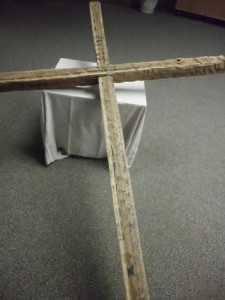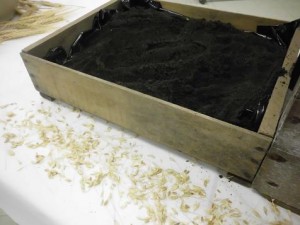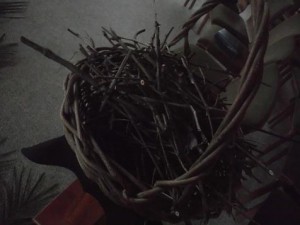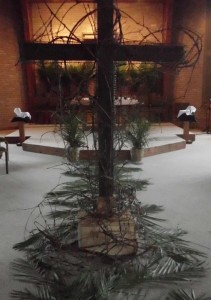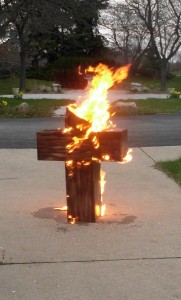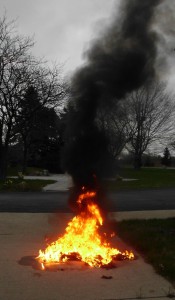Tonight our church conducted something called “The Stations of the Cross.” Growing up, I’d never heard of this tradition, but apparently it originated in the Catholic Church. During Easter week, parishioners walk Jesus’ path toward the crucifixion, praying through each stage of his dreadful journey. The point is to ponder Christ’s suffering and death, appreciating it anew. Our initial prayer tonight was, “Let me see what once you did for love of me and all the world.”
I overheard one attendee said, “Isn’t this a Catholic thing?”
But another said, “Yes, and we grew up thinking we shouldn’t do it because they did.”
We were given a booklet listing 14 stopping points throughout the church, each with a suggested prayer and an opportunity to participate in Jesus’ experience.
At Station 1 we found a bowl of water representing Pilate washing his hands of Jesus, along with a gavel we could bring down in judgment representing the mob that unjustly condemned him.
At Station 2 we were invited to lift a heavy wooden cross as we thought about Jesus carrying that burden on his flogged and bleeding back. It symbolized the weight of our sins, so heavy they crushed him completely.
We were encouraged to choose a large, dirty rock and feel its weight, then write one of our sins on it and throw it into a garbage can, receiving forgiveness and leaving sin behind.
There was a station representing the love of Jesus’ mother and his love for her, expressed on the cross. Another station urged us to accept a small handkerchief as a symbol of the comfort so many in this world need but don’t receive, just as Jesus needed comfort on his painful journey. As Christians we ought to provide that comfort, even for someone who’s been disfigured and might be covered with spit, blood and sweat as Jesus was.
On we walked through each station, arriving at Station 8 where we approached a bowl of salty water representing Christ’s tears. If we so desired, we could taste them from a cup, sharing a tiny bit in his suffering. We were reminded of Psalm 126:5, “When we sow with tears, we’ll reap with songs of joy.”
We meditated in front of clothes representing Christ’s stripping and humiliation for us and prayed for a willingness to be stripped of whatever hinders our full submission to him – possessions, affections, addictions.
At Station 11 we planted wheat seeds in rich, black earth and meditated on John 12:24: “Unless a kernel of wheat falls to the ground and dies, it remains only a single seed. But if it dies, it produces many seeds.” Jesus spoke these words in reference to his own impending death.
As we approached a full-sized, vine-wrapped cross at Station 12, we put dead branches onto it, symbolizing Jesus’ death. By this time I was feeling cold and shaky with a deep sadness from head to toe. Holding back tears was difficult, but Station 13 was harder yet.
Spread on the sanctuary communion table was a flax colored cloth (behind the cross) representing the removal of Jesus’ body and preparation for burial. Beside the cloth were bowls of sweet-scented spices. Something about touching that cloth made his death poignantly real for me, and the tears spilled. “I’m so sorry,” I whispered.
The last station found each of us sitting alone in the dimly-lit sanctuary while solemn music played, all of us in one-on-one conversation with the Savior. My little white hankie from Station 6 came in handy!
After sharing communion together, we went outdoors where a dramatic scene ended the evening. At one of the stations we’d been invited to leave our burdens at the cross by writing them on small cards and putting them inside a cardboard cross. The cross was now set on fire, and our burdens were lifted heavenward by the flames.
“When they had crucified him… they kept watch over him there. Above his head they placed the written charge against him: THIS IS JESUS, THE KING OF THE JEWS.” (Matthew 27:35-37)

